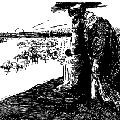08. Back to the Fatherland
"Shout, Israel Let the joyful cry Pour forth the notes of victory, High let it swell across the sea, For Jacob's weary tribes are free." —RUSKIN (aged thirteen)
For two hundred and fifteen years the Israelites had lived in Egypt. Now they had passed from Africa, into Asia. Not one of them could remember Jacob now, or his long journey down into Egypt. Behind—right across the waters—lay the strange land of their exile, the land of Egypt with its life-giving river, its pyramids, its stone statues, its tyrant kings. Behind, lay the endless stir and life of the busy Egyptians, with their trained armies marching through their walled cities, their vast processions with drums and cymbals, the rumble of their horses and chariots.
Before them lay mile after mile of burning desert land, through the deep silence of which, they must march, day after day, week after week, month after month. Now and then they might rest by some spring of water to refresh themselves and their little ones, their camels and their asses. But onward and ever onward they pressed towards the land of Canaan.
For months they wandered thus, now deeper and deeper into the mountains, struggling over rugged passes, till they reached the desolate range of the hills of Sinai. From these heights their leader Moses brought to them the code of laws, by which they were to live, the code of laws by which we live to-day—the Ten Commandments.
After a long stay in the desert land of Sinai, the six hundred thousand exiles set forth once more on their weary march north, to Canaan. It must have been a great day, when they first caught sight of the river Jordan, across which lay their new country, even though across that river their leader Moses was not to lead them.
The story of his death is perhaps one of the saddest in history. Encamping his people in the plain below, he went up into a high mountain from which he could see the land he was never to reach. Beneath him lay the black tents of the Israelites, behind him the weary waste of hot sand and the bitter waters; while away across the river Jordan he could see the land of Canaan stretching away to the sea—the good land "flowing with milk and honey," the land for which he had gladly borne toils and dangers, for which he, too, had hungered and thirsted. It was his last view. From that mountaintop he came down no more. In that strange land he died, and another man was chosen to lead on the people.
Joshua was a simple, straightforward, undaunted soldier—"strong and of a good courage." He turned neither to the right hand nor to the left hand. At the head of the hosts of Israel he went right forward from Jordan to Jericho, from Jericho to Ai, onwards and onwards, till his work was done, and the children of Israel had conquered the Promised Land.
It stretched from the river Euphrates, from the banks of which Abraham had wandered so long ago, right away to the river of Egypt,—the Nile, while its shores were washed by the Great Sea, the value of which, as yet, they knew not.
It was the highway between the two great rivals of the Old World; the only road by which they could approach each other, by which alone, the Chaldeans could get to Egypt, and the Egyptians to Chaldea, lay along the broad flat strip of coast belonging to Canaan.
What a land this was to possess! After the weary march of forty years, through the lonely desert, after the daily struggle for existence, after the hunger, the thirst, the anxiety, and long, delayed hope, the new fatherland must have been very welcome. Very welcome the shade of palm-tree and olives, of vineyards and fruit-trees, welcome the hills and ravines, the gushing spring and green plains. There were cattle, sheep, and goats on the hillsides; there were waving cornfields in the sunny plains; there were flowers blooming in the early summer when they first arrived, and bees swarming round their combs in rock and wood.
No wonder, then, the way-worn travellers should love to dwell on the words that had cheered them through the weariness of the way; to them it was indeed "a land flowing with milk and honey, the glory of all lands."

